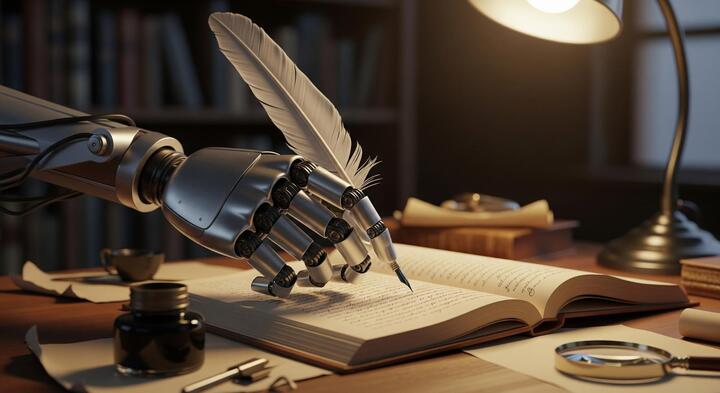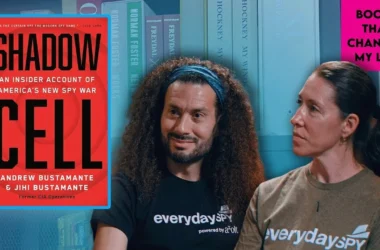AI writing assistants have quietly infiltrated our documents for years. But now they’re coming for something far more precious: the stories that define us. Should we be worried? Absolutely.
By Jayne Turner – Staff Writer
Here’s a fun fact that might unsettle you: you’ve been using AI writing tools for years without knowing it.
That grammar check in Microsoft Word? AI. Google Docs’ predictive typing that finishes your sentences? AI. Syntax corrections, autocomplete suggestions, even those little squiggly lines policing your comma placement—all powered by artificial intelligence. Another common AI tool: plagiarism trackers. Check out this article on the different types.
But these tools are harmless helpers, right? They catch typos, smooth out awkward phrasing, and ultimately make writing easier.
Then came the past 16 months, and everything changed.
Now AI isn’t just correcting your grammar—it’s writing entire novels. And not slowly, the way humans labor over manuscripts for months or years. We’re talking five-book series generated in hours. As if being a writer wasn’t hard enough, authors must now compete with entire data centers cranking out content at inhuman speeds.
Welcome to the existential nightmare keeping every serious writer awake at night.
The Assembly Line of Artificial Stories
Most AI-written books are exactly what you’d expect: soulless, derivative, and painfully artificial. They read like they were assembled rather than written, because that’s exactly what happened. Algorithms mashed together patterns from thousands of other books, regurgitated familiar plots, and slapped on a cover designed by—you guessed it—more AI.
But here’s where it gets truly dystopian.
The same day a human author releases their book on Amazon—a work they poured years into, sacrificing sleep and sanity to birth into existence—an “AI summary” of that exact book appears below it in the search results. A parasitic knockoff created in minutes now “speaks” for the original that demanded blood, sweat, and tears.
This article goes into detail about Amazon’s recent AI offenses.
Let that sink in. The AI didn’t even write something original. It summarized someone else’s hard work and is now competing for the same readers’ attention and dollars.
Garbage In, Catastrophe Out
This isn’t just about protecting authors’ livelihoods (though that matters). This is about something far more fundamental: truth.
Books are society’s primary educational infrastructure. They’re how we transmit knowledge, preserve history, and wrestle with complex ideas across generations. Now we’re staring down a future where people get “educated” through third-hand summary books written by large language models trained on Reddit threads and 4chan posts.
Yes, you read that correctly. Reddit and 4chan—bastions of reliable information and nuanced discourse. What could possibly go wrong?
Remember 2020? Remember the chaos of conflicting reports, the “facts” that turned out to be fiction, the wild pendulum between “it’s no big deal” and “it’s the apocalypse”—both spectacularly wrong? That information crisis was driven by humans. Now imagine amplifying that chaos through AI systems that can’t distinguish between credible sources and internet nonsense, then packaging it as authoritative “books.”
We’re on the verge of institutionalizing the classic programming principle: garbage in, garbage out. Except now the garbage is masquerading as education.
In our current (admittedly imperfect) system, fundamental truths eventually emerge. It takes time—sometimes years—but rigorous research, peer review, and honest scholarship tend to land somewhere near reality. Statistics don’t lie. Results speak for themselves. Human-written books and studies, for all their flaws, are grounded in the messy, complicated process of discovering what’s actually true.
AI has no concept of truth. It only knows patterns.
The Irreplaceable Human Heart
But let’s set aside the epistemological nightmare for a moment and talk about something equally important: what makes literature worth reading in the first place.
Human-written books have heart. Soul. That indefinable something that makes you cry over fictional characters at 2 AM or feel understood for the first time in your life.
Serious authors don’t just plot out stories—they pour themselves onto the page. Their deepest sorrows echo through tragic scenes. Their brightest triumphs shine through moments of hope. They encode pieces of themselves, their loved ones, their lived experiences into every chapter. Sometimes these personal elements are subtle, woven invisibly into the fabric of the story. Other times they’re raw and obvious, bleeding through the prose.
But whether subtle or overt, we know it’s there. Readers can sense authenticity. We can feel when someone has genuinely lived something, felt something, risked something by committing it to the page.
AI cannot replicate this. Not now. Probably not ever.
An algorithm can mimic sentence structure and plot conventions. It can generate technically correct prose that follows all the “rules” of storytelling. But it cannot bleed onto the page. It cannot transform personal pain into universal truth. It cannot take the specific, messy details of one human life and somehow make them resonate with thousands of other lives.
That alchemy is uniquely, stubbornly, beautifully human.
Fighting for the Future of Stories
So what do we do? How do we protect literature—and by extension, education, truth, and human expression—from being swallowed by the algorithm?
Amazon, to its minimal credit, is implementing some guardrails: publication-per-day caps and mandatory disclosure when AI is used. Is this better than nothing? Sure. Is it an actual solution? Absolutely not.
These are band-aids on a hemorrhage. They slow the flood but don’t stop it.
The real solution requires all of us—writers and readers alike—to make conscious choices:
Authors
Resist the temptation to use AI as anything more than a brainstorming tool. Let it throw random prompts at you if you’re stuck. Let it help organize notes. But the moment you let it write your prose, you’ve surrendered the very thing that makes your work valuable.
Are you an author looking for a tool to help your writing? Check out this article on how copywriting can help you write a successful book.
Readers
Vote with your wallets and attention. When you spot AI-generated content (and trust me, it’s increasingly obvious), don’t buy it. Don’t read it. Don’t give it oxygen. Support human authors, even when their books cost more and take longer to produce. Especially then.
The future we’re careening toward—one where most books are written by large language models trained on the internet’s collective brain rot—is bleak. Heartless. Sterile.
Remaining fully, messily, imperfectly human in the face of this will be one of our generation’s defining challenges. And maintaining our written word as the primary format for education and record-keeping should rank among our highest priorities.
Because if we don’t fight for this—if we let convenience and cheapness win over craft and soul—then the machines haven’t just won.
They’ve erased the very thing that made us human in the first place: our stories.
The choice is ours. But the clock is ticking.
—
Author: Jayne Turner is a freelance writer from Orange, California. She has a bachelor’s degree in Neuroscience with an emphasis on language and cognition. She has ten years of musical theatre experience and a lifelong love of reading. Utterly excited by the brain, she brings a fresh Gen Z perspective to the topics that intrigue us most.






